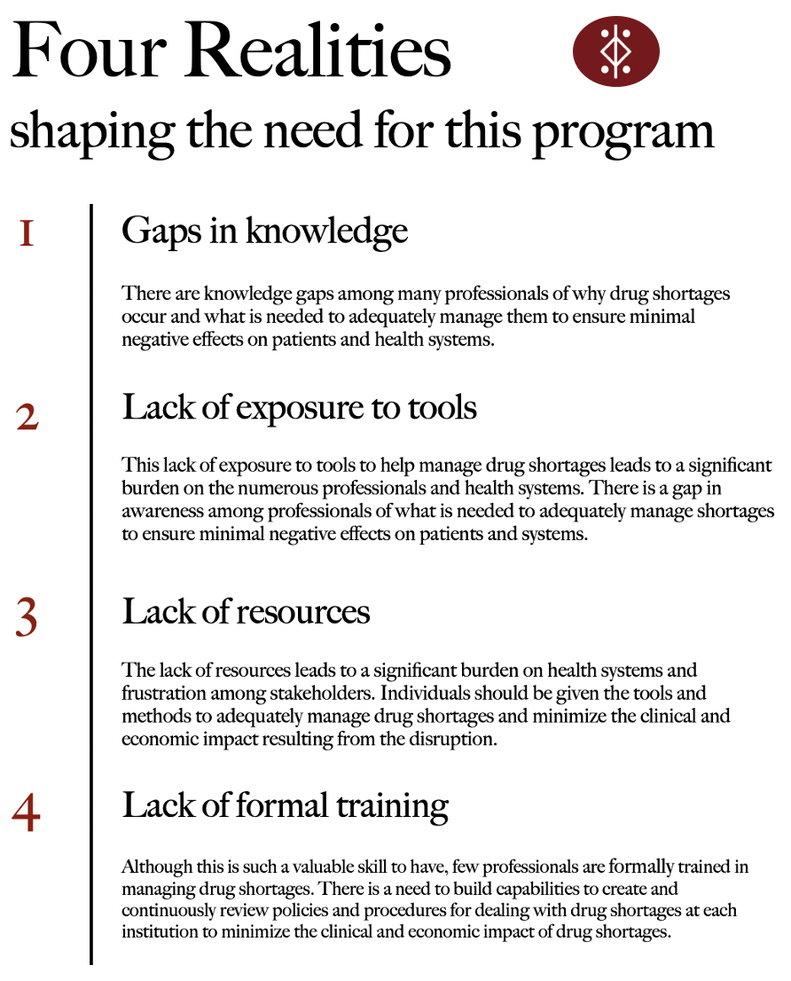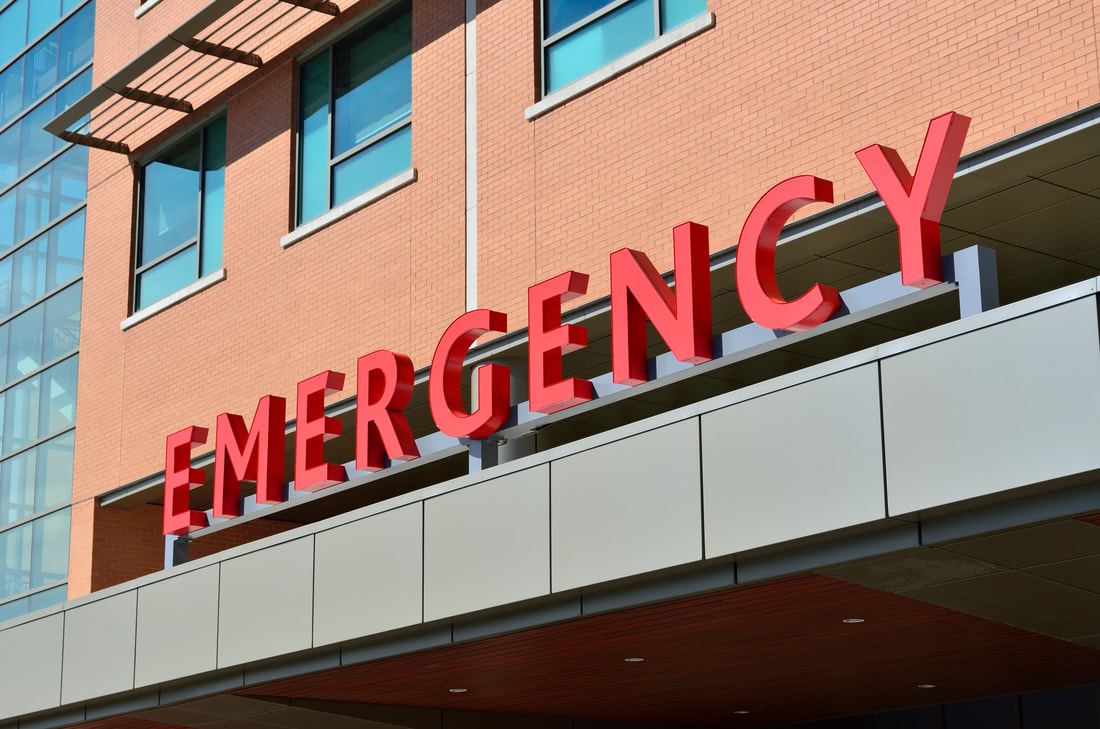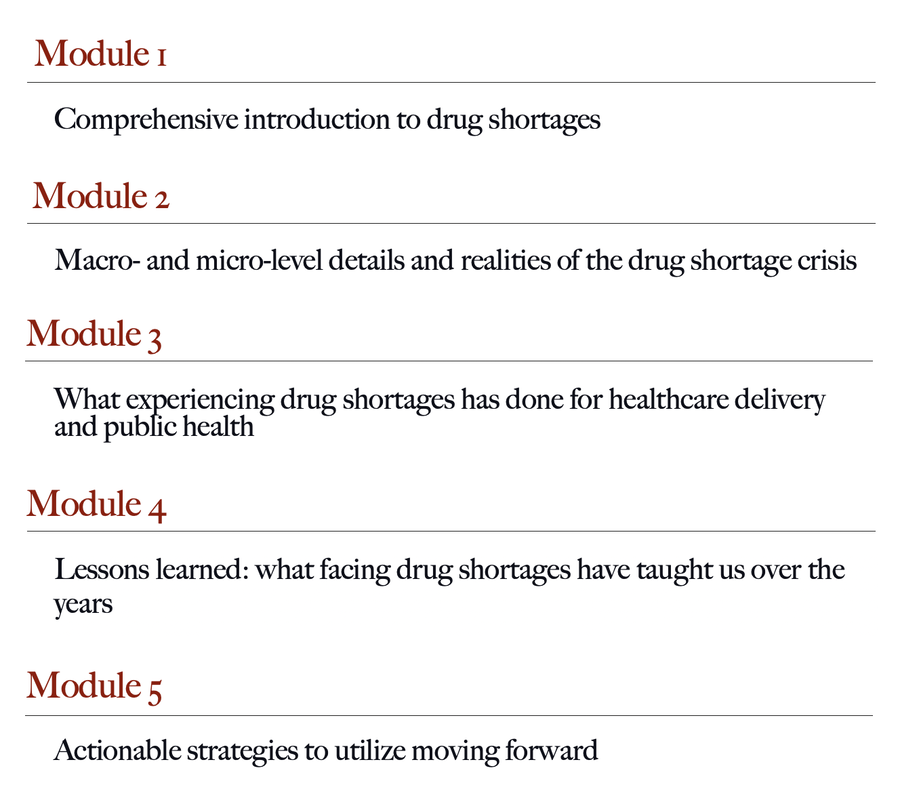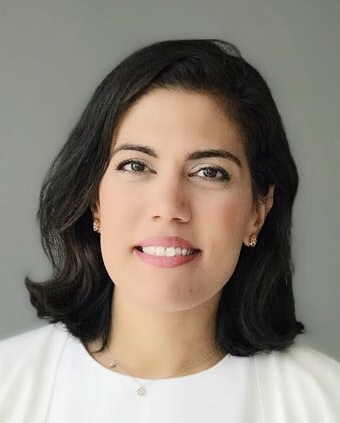Certificate Program
|
Location | Virtual
|
Date | September 23rd, 2024
|
|
Learn the skills, strategies, tools, and actionable techniques to address disruptions in medication supplies, now and in the future.
|
About
|
Start | September 23rd, 2024 Duration | 8 to 10 hours Location | Virtual Fees | Member: $600 ; Non-Member: $650 Registration Deadline | September 1st, 2024 |
Participants will receive the training and resources required to develop practical strategies and a certificate of completion at the end of the program. Participants will have access to this online program starting on September 23rd, 2024. Non-members will have until November 11th, 2024 to complete the program to receive the certificate. Members will have until November 25th, 2024 to complete the program to receive the certificate.
Drug shortages of essential drugs are becoming increasingly prevalent and are considered a global public health crisis.
|
|
With hundreds of medications already in short supply, drug shortages create an additional burden on the supply chain, healthcare professionals, and, ultimately, patients. In addition to the added costs of acquiring the medications, drug shortages management consumes a significant amount of personnel time – costing health systems hundreds of millions a year. Institutions have had to hire professionals specifically to tackle drug shortages.
|
“This program has opened my eyes to how commonly drug shortages occur and how long they may last. My perception of the drug shortage impact on patient care as well as professionals' workloads is more comprehensive now.” - Program Participant
|
The presence of drug shortages significantly threatened universal efforts to increase access to safe and quality care and considerably increased costs of care. While the number and type of drug shortages can vary among regions, their impact has been identified in both developed and developing countries. The implications of drug shortages are felt across the board, affecting all elements of health systems and facilities - as well as patients and their families.
|
“My knowledge about drug shortages was based on experiences and practices. I was happy that things that I am currently doing are well-evidenced and practiced in various places around the world. I got additional new concepts that will integrate as well, and I have to check whether additional strategies can be implemented.” - Program Participant
|
“I've developed a better understanding of why drug shortages occur at various levels of the supply chain. The negative impact of drug shortages was summarized well, but also not very surprising based on my experiences working in various hospital settings.” - Program Participant
“After taking this program, I have been much more transparent with my customers in regard to availability of our products, even when the news is bad and it makes the customer unhappy. What I've learned is that we are not the only company going through such issues and 99% of the time, the customers are appreciative of the honesty!” - Program Participant “After taking this program, we have improved the communication between all stakeholders and reactivate the existing committees.” - Program Participant |
This program focuses on addressing the four unmet needs of gaps in knowledge, lack of exposure to tools, lack of resources, lack of formal training.
Benefits
Who
|
This program is designed for diverse stakeholders in healthcare at all stages of their careers. Early, mid -, and senior professionals must be equipped to address the drug shortages. Several stakeholders and players have stepped up and are at the forefront of addressing access to medication concerns caused by drug shortages.
|
|
Executives
|
|
Front-line Healthcare Staff
|
|
Policymakers
Individuals in public and private sectors developing policies pertaining to medications.
|
The lessons outlined in this program apply to professionals in all facilities, regardless of size, and across various healthcare settings (e.g., inpatient, outpatient, hospitals, clinical, medical groups, immediate and acute care settings, and community settings).
|
“I will take the action of further educating myself on the issue in my region and finding helpful and informative resources to stay updated. I will share knowledge gained from this course with colleagues and friends who are in positions to make a change.” - Program Participant
|
How
|
How to
|
|
The enrollment process is quick, easy, and requires no special documentation. Follow the prompts to enroll in the program.
|
The program is intentionally designed with limited access to prompt participants to learn and implement the material swiftly. This encourages participants to immerse themselves fully in the content and swiftly integrate new skills into their professional or academic pursuits. We aim to cultivate proactive learning habits and work to ensure participants can leverage their newfound skills effectively in real-world scenarios within a recent timeframe. The hope is that participants take action on what they’ve learned shortly after enrolling and completing the training. Please be mindful of the dates when enrolling.
Meet
|
Our team is comprised of a network of intelligent and respected experts across disciplines who are passionate, socially aware, and rational subject matter experts. We collaboratively work to provide innovative solutions to complex issues in our societies. Salus Vitae Group has the breadth of experience, technical knowledge, and strategic foresight to make ideas come to life. For more information on our Team, visit us here.
|
Meet the Faculty
|
Dr. Rola Kaakeh
|
Dr. Kaakeh is the CEO of Salus Vitae Group and author of the book "The Art of Pharmacoeconomics." She is a fellowship-trained, licensed pharmacist with over sixteen years of experience in various settings and institutions. She has produced numerous impactful publications, received a number of awards, and presented on several global, prominent stages to address pressing healthcare issues. Her work highlighting the burden of drug shortages in the US has been cited over 200 times and used as supporting data for national policies and regulations. She has been very involved in education and training regarding the management of drug shortages, understanding the various dynamics involved, and helping evaluate and design processes (from institution to policy level) to improve access to medications. She comes to you with over a decade of experience in this space. She holds a Doctorate in Pharmacy from Purdue University, and completed a Post-Doctoral Fellowship in Pharmaceutical Outcomes and Health Services Research from the University of Michigan.
|
|
|
Medications are and will continue to be an integral part of healthcare delivery; however, the World Health Organization estimates that 2 billion people globally still lack access to essential medications. Dr. Rola Kaakeh shares her vision of a society in which the struggle to access medications does not exist.
|
|
Frequently Asked Questions
|
Have
|
Do you have questions and need more information? Email us at [email protected] or answer the questions below. We would be delighted to discuss the program with you and answer all your questions. You will receive a follow-up email from our team.
|









